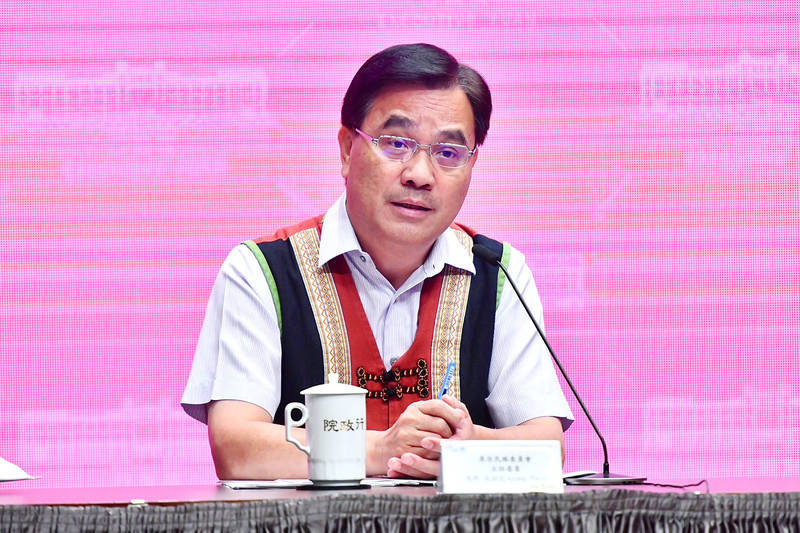《TAIPEI TIMES》 Cabinet approves bill on indigenous legal rights

Council of Indigenous Peoples Minister Icyang Parod speaks to reporters after a Cabinet meeting in Taipei yesterday. Photo courtesy of the Executive Yuan
CHANGES: The Status Act for Indigenous Peoples has been updated so that people from an non-indigenous adoptive family can now obtain indigenous status
By Chung Li-hua, Rachel Lin and Jonathan Chin / Staff reporters, with staff writer
The Executive Yuan yesterday approves amendments to make it easier for Taiwanese to be legally recognized as a person of indigenous descent, which would open more public sector jobs for affirmative action targeting indigenous Taiwanese.
The Status Act for Indigenous Peoples (原住民身分法) stipulates that children from marriages with one indigenous parent can obtain indigenous status after taking an indigenous-language name, the Council of Indigenous Peoples said.
The children of a mixed marriage can claim indigenous status after including the indigenous parent’s traditional name in their own, meaning they can keep a Mandarin Chinese name, the council’s proposed changes said.
The changes would stipulate that a person of indigenous descent raised in a non-indigenous adoptive family can obtain indigenous status by the same method without being constrained by regulations concerning surname changes in the Civil Code, the council said.
In addition, Taiwanese who voluntarily relinquish their indigenous status can regain it once in a lifetime, it said.
Under the Indigenous Peoples Employment Rights Protection Act (原住民族工作權保障法), government offices have a quota for indigenous employees to meet or they must pay an exemption fee, it said, adding that this only applied for menial jobs.
The amendments to the law would mandate government offices to fill indigenous quotas across all categories of work, the council said.
However, government offices that have a valid reason for not meeting the quota would not have to pay an exemption fee, it said, adding that what constitutes a valid reason would be determined by an appropriate regulatory authority.
The proposed changes mandate that central government offices headquartered in an indigenous region must meet a 3 percent quota of indigenous employees, which is the proportion of indigenous people in the nation’s population, the council said.
The amendments showed that central government offices and agencies, public schools and state-owned enterprises headquartered in indigenous areas must meet a 3 percent indigenous quota in hiring, it said.
That figure was determined by the proportion of indigenous people in the nation’s population, it added.
For local government offices in an indigenous region, their quota is to be decided by the proportion of the indigenous population residing in their jurisdiction, it said.
The exemption fee to be paid by government contractors would be calculated according to a reduced rate, as the current formulae were taken down by the nation’s constitutional judges, it said.
The changes to the indigenous identity rules are made to create an objective and consistent standard for laying claims to indigenous status, said Yapasuyongu Poiconu, director of the council’s Comprehensive Planning Department.
The council hopes the amendment would protect the right to identity while emphasizing people recognized as members of an indigenous group have a responsibility to the continuance of its traditional language and culture, he said.
Additional reporting by CNA
新聞來源:TAIPEI TIMES




















